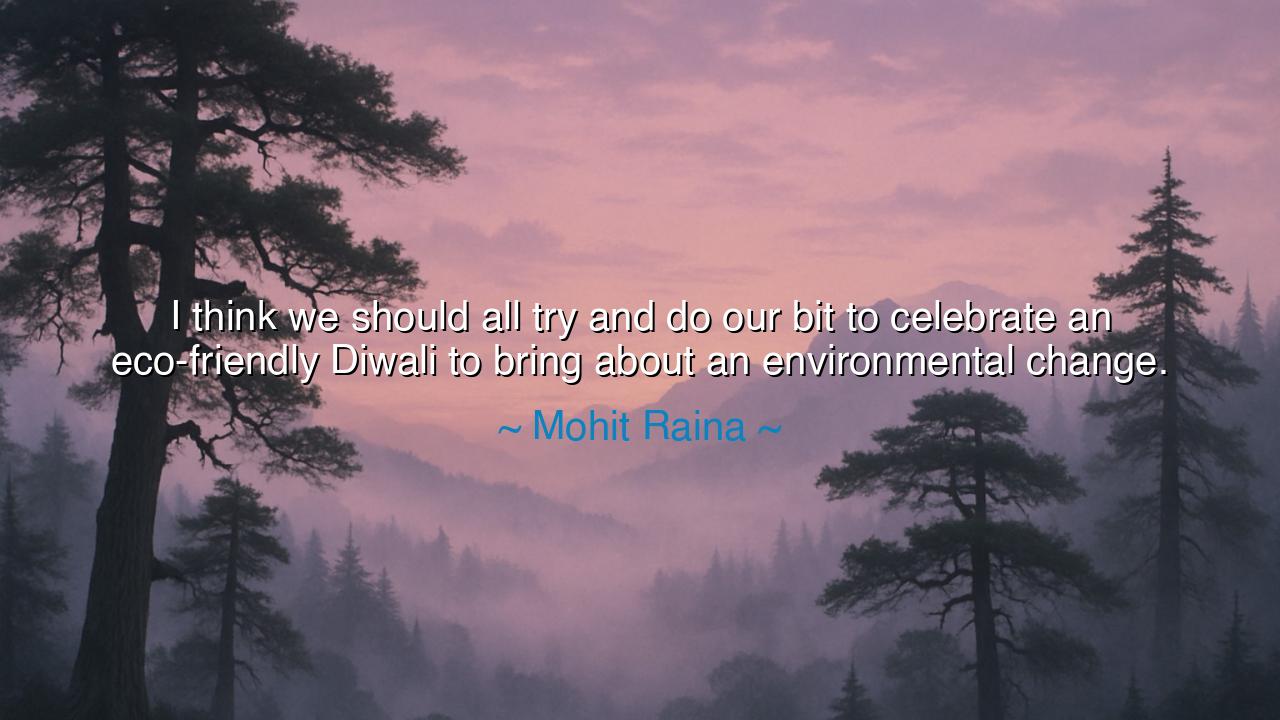
I think we should all try and do our bit to celebrate an
I think we should all try and do our bit to celebrate an eco-friendly Diwali to bring about an environmental change.






In the words of Mohit Raina: “I think we should all try and do our bit to celebrate an eco-friendly Diwali to bring about an environmental change.” These words are not simply a suggestion for a festival, but a call to awaken the conscience of a people. They remind us that even in moments of joy and celebration, we must not forget our duty to the earth, the eternal mother who sustains us. For what is a festival if not a union of human spirit with the spirit of creation? And what is Diwali, if its light does not also illuminate the path of responsibility?
The ancients taught that true celebration is not in excess, but in harmony. The fire of the lamp was once a symbol of purity, of light overcoming darkness, of knowledge banishing ignorance. Yet in the modern age, this sacred flame has been obscured by smoke and noise, as fireworks choke the sky and disturb the air. Raina’s words remind us that the essence of Diwali is not in deafening explosions, but in the gentle glow of the lamp, in the light of love, family, and wisdom. To celebrate an eco-friendly Diwali is not to abandon tradition, but to restore it to its original spirit.
Consider the tale of the River Ganges, sacred and eternal, yet poisoned in our own time by careless ritual and heedless waste. Pilgrims come to honor her, yet leave behind offerings that choke her waters. So too with Diwali—a festival meant to honor light and life, but when practiced without mindfulness, it harms the very air we breathe and the creatures that share our world. This is the paradox Raina seeks to heal: to remind us that honoring tradition does not mean destroying creation, but preserving it.
The call for environmental change is not only for the planet, but for the soul. When we restrain ourselves from wasteful excess, we learn humility. When we choose natural lamps over chemicals, community over noise, we rediscover the true joy of the season. The ancients would call this dharma—duty not only to self, but to the greater order of existence. To live in this way is to realize that the festival is not a fleeting night of splendor, but a teaching for how to walk upon the earth with reverence.
History too gives us lessons. In Japan, the festival of Hanami celebrates the cherry blossoms. Yet the people there tread lightly, leaving little trace, for they understand that beauty is fragile. The blossoms are admired, not plundered; the moment is honored, not destroyed. Should not Diwali, the festival of light, be treated with the same reverence? To celebrate with respect for the earth is to make the light eternal, not momentary.
The lesson of this quote is plain: each person must “do their bit.” Great change is not brought by kings alone, but by the countless small actions of ordinary people. To refuse a single firecracker, to light a clay lamp instead, to plant a tree in honor of the season—these acts may seem small, but when multiplied by millions, they reshape the destiny of a nation. For the earth does not ask for grand sacrifices, only for mindful living, for each person to carry their share of responsibility.
So let these words be carried forward: celebrate with joy, but also with wisdom. Let your Diwali be bright with love, not smoke; filled with song, not noise; crowned with gratitude, not waste. In this way, the festival becomes not only a remembrance of light’s victory over darkness, but also a pledge to guard the earth itself. And know this: every small act of care, every mindful choice, is a lamp lit against the darkness of neglect. Together, these lamps can bring forth the dawn of true environmental change.






AAdministratorAdministrator
Welcome, honored guests. Please leave a comment, we will respond soon